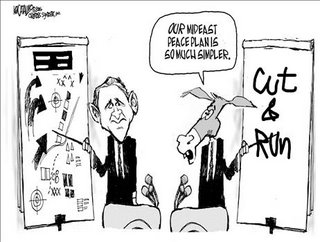Democrats Plan Missing

The Democrats' Iraq Problem
By David Ignatius
WASHINGTON -- No matter how you slice it, the National Intelligence Estimate warning that the Iraq War has spawned more terrorism is big trouble for President Bush and his party in this election year. It goes to the heart of Bush's argument for invading Iraq, which was that it would make America safer.
Many Democrats act as if that's the end of the discussion: A mismanaged occupation has created a breeding ground for terrorists, so we should withdraw and let the Iraqis sort out the mess. Some extreme war critics are so angry at Bush they seem almost eager for America to lose, to prove a political point. Even among mainstream Democrats, the focus is "gotcha!'' rather than "what next?'' That is understandable, given the partisanship of Republican attacks, but it isn't right.
The issue raised by the National Intelligence Estimate is much grimmer than the domestic political game. Iraq has fostered a new generation of terrorists. The question is what to do about that threat. How can America prevent Iraq from becoming a new safe haven where the newly hatched terrorists will plan for 9/11-scale attacks that could kill thousands of Americans? How do we restabilize a Middle East that today is dangerously unbalanced because of America's blunders in Iraq?
This should be the Democrats' moment, if they can translate the national anger over Iraq into a coherent strategy for the future. But with a few notable exceptions, the Democrats are mostly ducking the hard question of what to do next. They act as if all those America-hating terrorists will evaporate back into the sands of Anbar province if America pulls out its troops. Alas, that is not the case. That is the problem with Iraq -- it is not an easy mistake to fix.
An example of the Democrats' fudge on Iraq was highlighted this week by Post columnist Dana Milbank in his description of retired Maj. Gen. John Batiste's appearance before the Senate Democratic Policy Committee. They cheered Batiste's evisceration of Defense Secretary Donald Rumsfeld, but tuned out Batiste's call for more troops and more patience in Iraq, and his admonition: "We must mobilize our country for a protracted challenge.''
Here's a reality check for the Democrats: There is not a single country in the Middle East, with the possible exception of Iran, which favors a rapid American pullout from Iraq. Why? The consensus in the region is that a retreat now would have disastrous consequences for America and its allies. Yet withdrawal is the Iraq strategy you hear from most congressional Democrats, whether they call it "strategic redeployment'' or something else.
I wish Democrats (and Republicans, for that matter) were asking this question: How do we prevent Iraq from becoming a failed state? Many critics of the war would argue that the worst has already happened -- Iraq has already unraveled. Unfortunately, as bad as things are, they could get considerably worse. Following a rapid American pullout, Iraq could descend into a full-blown civil war, with the Sunni-Shiite violence spreading outward throughout the region. In this chaos, oil supplies could be threatened, sending the price of oil well above $100 a barrel. Turkey, Iran and Jordan would intervene to protect their interests. James Fallows titled his collection of prescient essays warning about the Iraq War "Blind into Baghdad.'' We shouldn't compound the error by being "blind out of Baghdad,'' too.
The Democrat who has tried hardest to think through these problems is Sen. Joseph Biden. He argues that the current government of national unity isn't succeeding in holding Iraq together, and that America should instead embrace a policy of "federalism plus'' that will devolve power to the Shiite, Sunni and Kurdish regions. Iraqis are already voting for sectarian solutions, Biden argues, and America won't stabilize Iraq unless it aligns its policy with this reality. I disagree with some of the senator's conclusions, but he's asking the right question: How do we fix Iraq?
America needs to reckon with the message of the National Intelligence Estimate. Iraq has compounded Muslim rage and created a genuinely dangerous crisis for the United States. The Democrats understandably want to treat Iraq as George Bush's war and wash their hands of it. But the damage of Iraq can be mitigated only if it again becomes the nation's war -- with the whole country invested in finding a way out of the morass that doesn't leave us permanently in greater peril. If the Democrats could lead that kind of debate about security, they would become the nation's governing party. But what you hear from most Democrats these days is: Gotcha.
Comments